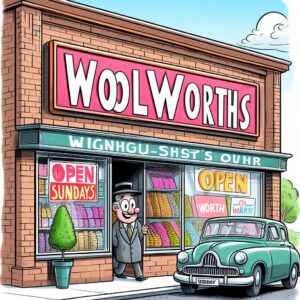
I never imagined the storm that one simple phrase and action would cause in a small town. Open Sundays—those two words opened a can of worms in Lewistown, Montana, in the mid-80s. Suddenly, I found the Board of Directors of the Chamber of Commerce at my door, leading the charge against me. I was on the Board myself, yet I hadn’t even been invited to whatever secret meeting was held to discuss my so-called abhorrent behavior.
According to this delegation, I was the devil incarnate and the reason for the downfall of Western civilization. My store was boycotted, and people in town would go out of their way to confront me, berating me for the evil I was allegedly inflicting on the community. If this sounds extreme, imagine the weight of that pressure on a 25-year-old outsider. I was trapped between my company and the community, stuck in a no-win situation.
A little background will help explain how I found myself in this predicament. When I arrived in Lewistown to manage the Woolworth store, it was my first solo assignment after two years of intensive training. The Woolworth management program was one of the best in the retail industry—comprehensive and rigorous. By the time I got my first store, I knew every aspect of running a variety store, from calculating the profit margin on a soda at the lunch counter to reading freshness codes on candy. I could run the sewing department and even explain how to obtain a hunting or fishing license.
While I knew the company inside and out, integrating into a small town was an entirely different challenge. I had moved from a city of over 300,000 people to a town of just 8,000. The social dynamics and community expectations were unlike anything I had experienced before.
One example of small-town life in rural Montana was my experience test-driving a new car. Fresh off a divorce, I decided I deserved a reward for surviving the ordeal. Every day, I walked six blocks to work, passing the local car dealership. One afternoon, I finally stopped to check out a new Chevy Nova. When I asked about a test drive, I explained that I hadn’t driven there and didn’t have a car to leave behind. Their response? “Don’t worry, we’re about to close. Just bring it back in the morning on your way to work.”
I was stunned. But I took them up on the offer, driving out along Upper Spring Creek to the gypsum plant and fish hatchery. The next morning, I returned the car, then brought my Datsun truck by at lunch, signed the papers, and drove my new car home that evening. That was just how things worked in Lewistown, and I miss that way of doing business. Fortunately, since moving to Laramie, I’ve been experiencing a bit of that small-town charm again.
In the end, the controversy over Sunday openings resolved itself more easily than I had expected. Another new merchant in town, Tom, had opened the IGA grocery store. Tom and his wife were well-respected pillars of the Lewistown community. After running the numbers, Tom realized that his store was only closed for a few short hours overnight—often while staff were still stocking shelves and receiving freight. He’d seen a business model in larger cities and decided to test it out. To his surprise, the cost of staying open 24 hours a day wasn’t significantly higher, and over time, the store could easily cover the expense.
So, Tom took the bold step of keeping IGA open 24/7, including Sundays. Many townspeople loved the convenience, but a certain portion of the community was outraged, seeing it as an attack on traditional values. The best part? They turned their attention away from me. I was no longer the primary villain in their morality play. I had been demoted to a second-tier demon, and I couldn’t have been happier.
Edit for clarity and grammar with AI. – Randy
